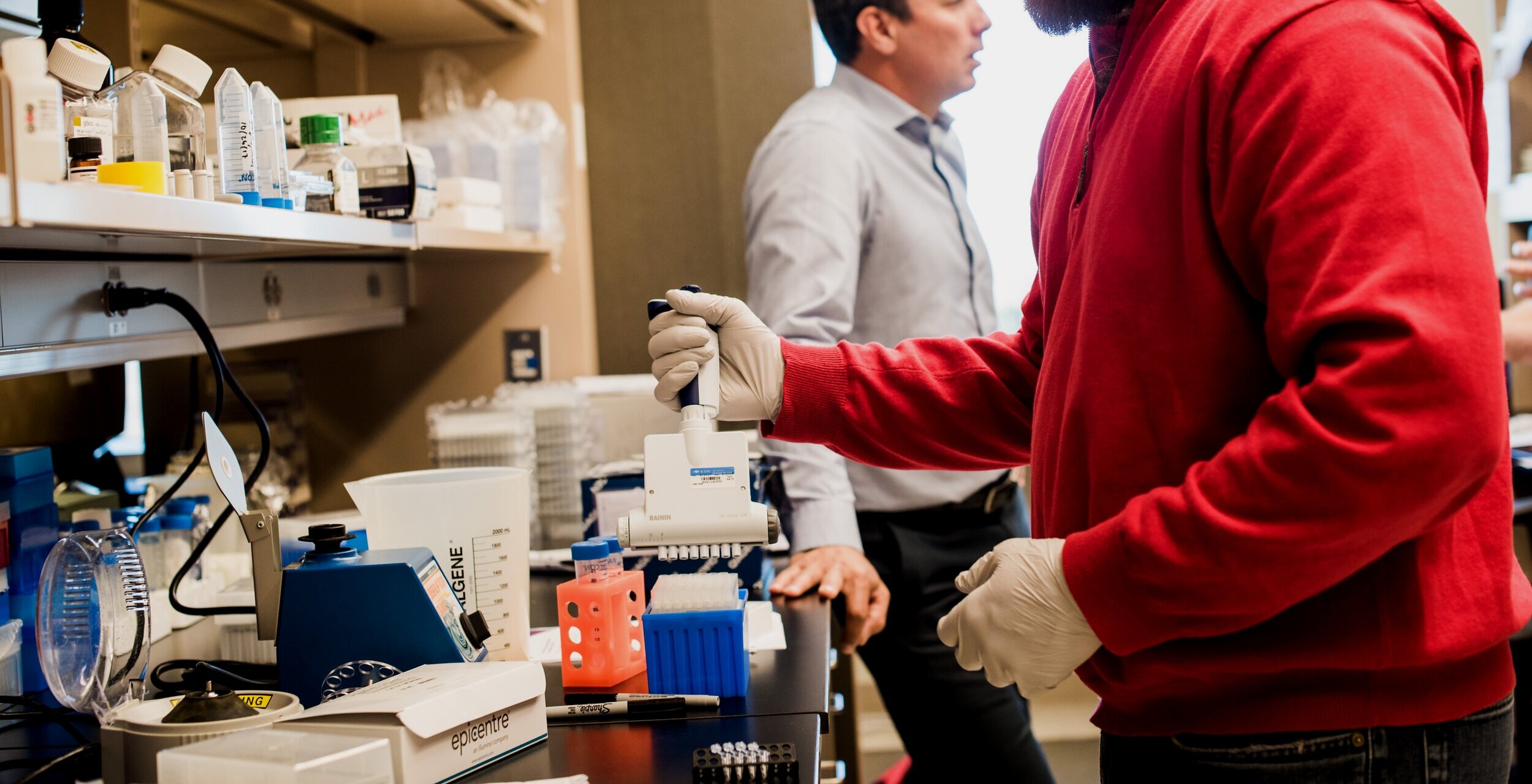
Research
Cancer Research
We define cancer as a disease of gene networks gone awry. Our research focuses on the molecular mechanisms by which cancer-relevant genes regulate the networks in which they are embedded.
We believe that this type of basic research is a step in the development of effective cancer therapeutics. This field is broad with many important questions, which inspires us to constantly expand our repertoire of approaches and technologies to find answers.
Our most recent endeavor is the development of an in-lab bioinformatics practice that allows us to rapidly transition from the computational analysis of genomics data to hypothesis-driven experiments at the bench. We are currently developing the animal models necessary to test the hypothesis generated by our cell-based experiments at the organism level.
Dr. Espinosa is a Professor of Pharmacology, Director of the Functional Genomics Facility in the University of Colorado Cancer Center and the Espinosa Lab partners closely with numerous Cancer Center teams.
Featured Publications
1. Inhibition of the proline metabolism rate-limiting enzyme P5CS allows proliferation of glutamine-restricted cancer cells
Glutamine is a critical metabolite for rapidly proliferating cells as it is used for the synthesis of key metabolites necessary for cell growth and proliferation. Glutamine metabolism has been proposed as a therapeutic target in cancer and several chemical inhibitors are in development or in clinical trials. How cells subsist when glutamine is limiting is poorly understood. Here, using an unbiased screen, we identify ALDH18A1, which encodes P5CS, the rate-limiting enzyme in the proline biosynthetic pathway, as a gene that cells can downregulate in response to glutamine starvation. Notably, P5CS downregulation promotes de novo glutamine synthesis, highlighting a previously unrecognized metabolic plasticity of cancer cells. The glutamate conserved from reducing proline synthesis allows cells to produce the key metabolites necessary for cell survival and proliferation under glutamine-restricted conditions. Our findings reveal an adaptive pathway that cancer cells acquire under nutrient stress, identifying proline biosynthesis as a previously unrecognized major consumer of glutamate, a pathway that could be exploited for developing effective metabolism-driven anticancer therapies.
2. FAM193A is a positive regulator of p53 activity
Inactivation of the p53 tumor suppressor, either by mutations or through hyperactivation of repressors such as MDM2 and MDM4, is a hallmark of cancer. Although many inhibitors of the p53-MDM2/4 interaction have been developed, such as Nutlin, their therapeutic value is limited by highly heterogeneous cellular responses. We report here a multi-omics investigation of the cellular response to MDM2/4 inhibitors, leading to identification of FAM193A as a widespread regulator of p53 function. CRISPR screening identified FAM193A as necessary for the response to Nutlin. FAM193A expression correlates with Nutlin sensitivity across hundreds of cell lines. Furthermore, genetic codependency data highlight FAM193A as a component of the p53 pathway across diverse tumor types. Mechanistically, FAM193A interacts with MDM4, and FAM193A depletion stabilizes MDM4 and inhibits the p53 transcriptional program. Last, FAM193A expression is associated with better prognosis in multiple malignancies. Altogether, these results identify FAM193A as a positive regulator of p53.
3. Cell differentiation modifies the p53 transcriptional program through a combination of gene silencing and constitutive transactivation
The p53 transcription factor is a master regulator of cellular responses to stress that is commonly inactivated in diverse cancer types. Despite decades of research, the mechanisms by which p53 impedes tumorigenesis across vastly different cellular contexts requires further investigation. The bulk of research has been completed using in vitro studies of cancer cell lines or in vivo studies in mouse models, but much less is known about p53 action in diverse non-transformed human tissues. Here, we investigated how different cellular states modify the p53 transcriptional program in human cells through a combination of computational analyses of publicly available large-scale datasets and in vitro studies using an isogenic system consisting of induced pluripotent stem cells (iPSCs) and two derived lineages. Analysis of publicly available mRNA expression and genetic dependency data demonstrated wide variation in terms of expression and function of a core p53 transcriptional program across various tissues and lineages. To monitor the impact of cell differentiation on the p53 transcriptome within an isogenic cell culture system, we activated p53 by pharmacological inhibition of its negative regulator MDM2. Using cell phenotyping assays and genome wide transcriptome analyses, we demonstrated that cell differentiation confines and modifies the p53 transcriptional network in a lineage-specific fashion. Although hundreds of p53 target genes are transactivated in iPSCs, only a small fraction is transactivated in each of the differentiated lineages. Mechanistic studies using small molecule inhibitors and genetic knockdowns revealed the presence of two major regulatory mechanisms contributing to this massive heterogeneity across cellular states: gene silencing by epigenetic regulatory complexes and constitutive transactivation by lineage-specific transcription factors. Altogether, these results illuminate the impact of cell differentiation on the p53 program, thus advancing our understanding of how this tumor suppressor functions in different contexts.